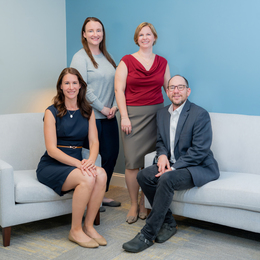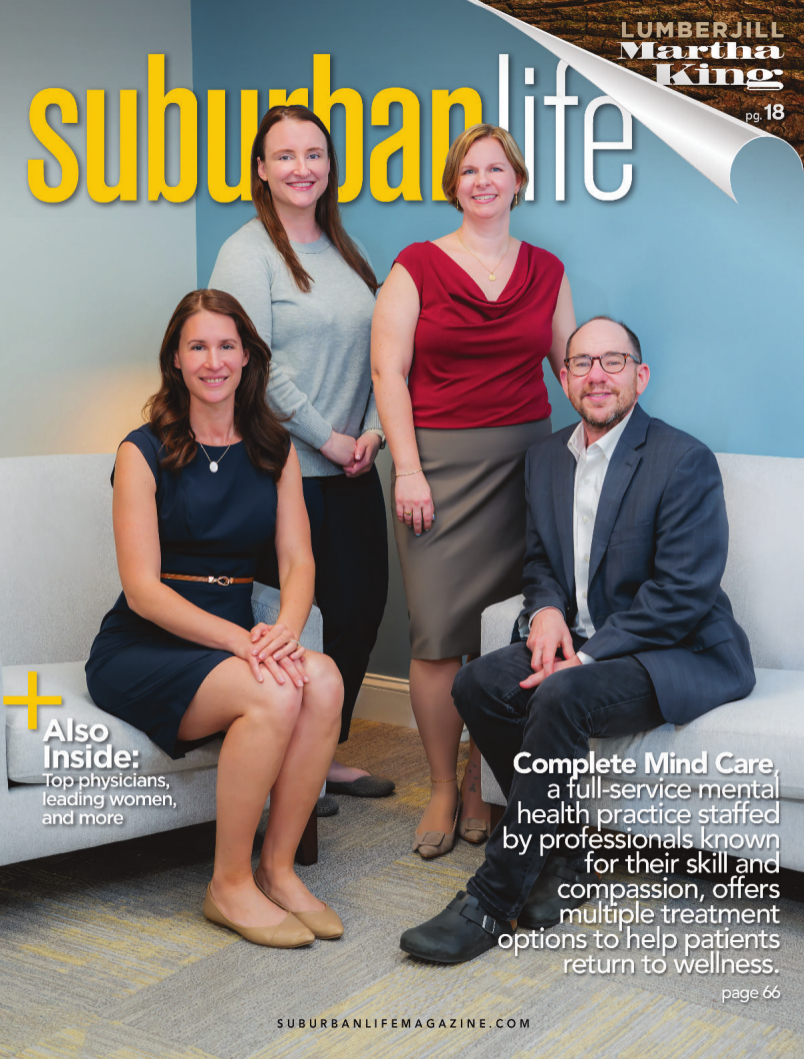
Hope on the Horizon
Complete Mind Care, a full-service mental health practice staffed by professionals known for their skill and compassion, offers multiple treatment options to help patients return to wellness
Last year, when Sam Seplow, D.O., was contacted by some colleagues about joining the new and promising mental health practice known as Complete Mind Care, he was intrigued by the possibilities. He had a background in clinical psychiatry spanning almost two decades, and a recent specialization in alternative treatment options such as transcranial magnetic stimulation (TMS), so he was already a strong proponent of offering patients a variety of pathways to wellness. When he learned that the organization’s mission aligned with his philosophy, he knew it was a perfect match.
“I’ve spent most of my career working in community mental health, where you treat a lot of chronically, severely mentally ill people with very limited resources,” says Dr. Seplow, the chief medical officer at Complete Mind Care. “One of the things that drove me to this practice was the ability to treat people with a wide array of modalities. Medication works great for some people and that’s all they need, but for a lot of people meds simply do not work or they are forced to deal with side effects.
“We need other treatment options, and that’s where things like TMS and [medications such as] SPRAVATO come in,” he continues. “I have been treating patients using TMS for over seven years now, and the results are so much better than treating with meds. We’re always looking for new things because we want our patients to have more options.”
Founded in Abington in 2022 and having since expanded to locations in Villanova and Horsham, Complete Mind Care is a full-service mental health provider treating children, adolescents, and adults. Its goal: to offer individualized treatment in a compassionate, confidential, and uplifting environment for a variety of diagnoses, including depression, anxiety disorders, and psychosis.
Complete Mind Care is also focused on helping those affected by autism spectrum disorder and ADHD.
“We have multiple service lines, including regular medication, psychotherapy, and a number of therapy groups in which the topics change,” Dr. Seplow says. “We have psychiatrists on staff, we have psychiatric nurse practitioners, we have psychotherapists ranging from doctorate level to master’s level, and we have trained technicians for the SPRAVATO and TMS treatments. The staff runs the gamut.
“In terms of therapy,” he continues, “we have a psychologist who runs the department, and she does the matching after intake to assign a patient with a particular therapist who has expertise in whatever they need. We’re always looking for therapists with specific certifications and specific training.”
Dr. Seplow is especially encouraged by the success rate the practice has achieved using TMS, a noninvasive outpatient procedure that uses magnetic waves to stimulate the brain. FDA approved to treat several diagnoses, TMS has very high success rates for OCD and depression, including treatment-resistant depression in which conventional approaches such as medication or therapy have not relieved symptoms.
“TMS has been around since the ’80s and FDA approved since 2008, but there are a lot of seasoned, competent mental health professionals who know little to nothing about it,” he says. “For people who have not done well on an antidepressant trial, especially by the second or third one, the data is unambiguous that TMS is a much more effective treatment. We have noticed an uptick in patients who do not even want to start on meds; they want to go straight to TMS, especially in 16- to 25-year-olds.
“Sometimes people struggle with depression for years or even decades, and just try medication after medication,” he continues. “I think we should change the treatment algorithm. The data is clear: Get these people into TMS alternative treatments sooner rather than later so they don’t have to struggle with depression for so long.”
Unlike many of the providers who do offer TMS, Complete Mind Care also accepts insurance for the therapy, because they are intent on making the treatment as accessible as possible. TMS is usually administered five days a week for about 36 sessions, each one lasting 20 minutes. Complete Mind Care offers flexible scheduling so patients can fit it into their daily routine.
“TMS is a small commitment for the patient, but if you ask the thousands of patients we have treated with TMS, they would tell you it is well worth it,” Dr. Seplow says. “Many say they have gotten their lives back.
“As mental health professionals,” he continues, “we do a disservice to patients by not presenting this as an option—and really a better option for people who have not done well on a couple of medication trials or don’t want medication at all. I don’t want anybody who’s not appropriate in the treatment, and I don’t want to provide treatment just for the sake of doing it. But for appropriate patients, I want to see them in TMS sooner rather than later.”
On June 15, Complete Mind Care will begin offering a highly customized use of TMS called MeRT, short for magnetic resonance therapy, which Dr. Seplow explains is TMS that starts with a simple EEG.
“It allows us to treat symptoms regardless of the diagnosis,” he adds. “It opens us up to a much broader range of diagnoses that we can treat. We’re really trying to focus on autism spectrum disorder, mostly mild to moderate, along with attention deficit disorder, PTSD, people who are post-stroke, people who are post-traumatic brain injury, and people with Parkinson’s disease. In addition, it allows us to treat cognitive thinking, memory, focus, reaction time, and improve overall brain health.”
Many protocols are currently in the process of receiving FDA approval, but much of the data from studies strongly supports the efficacy of MeRT, and many of those protocols have been approved for treatment in Europe. Dr. Seplow and Complete Mind Care’s technicians have received extensive training in the use of the equipment, which is FDA approved.
“We’re really excited about this endeavor,” Dr. Seplow says. “With thousands of people already treated using MeRT, practices across the country have been utilizing MeRT for over 10 years. Every day more and more data is collected, further supporting the efficacy of this groundbreaking treatment. It’s especially effective for some of the diagnoses we’re targeting, like autism spectrum disorder and post-stroke victims.”
He’s also optimistic about SPRAVATO, a ketamine nasal spray that can be used for patients with depression who have not responded to medication. The most recent results of Complete Mind Care patients using SPRAVATO show that a large majority experience significant improvement.
No matter what reason a patient has for enlisting the help of Complete Mind Care, they can rest assured knowing that they will receive personalized care from a compassionate staff. Dr. Seplow wants everyone in need to understand that it’s OK to ask for help.
“I think the pandemic had a huge influence on people willing to talk about mental health and seek help,” he says. “That’s one of the reasons why it’s harder and harder to get treatment, because there’s definitely a nationwide shortage of psychiatrists. Our whole goal here is to help people get better, and we’re committed to it.”
Complete Mind Care
Locations in Abington, Horsham, and Villanova
(215) 254-6000
CompleteMindCareOfPa.com
Locations in Abington, Horsham, and Villanova
(215) 254-6000
CompleteMindCareOfPa.com
Photo by Jody Robinson
Published (and copyrighted) in Suburban Life magazine, May 2024
Published (and copyrighted) in Suburban Life magazine, May 2024



